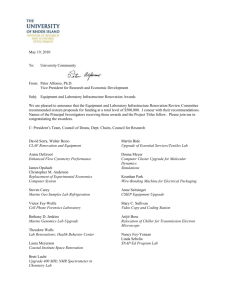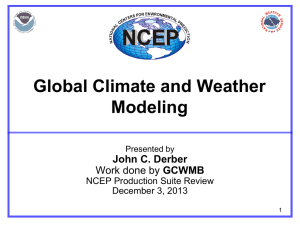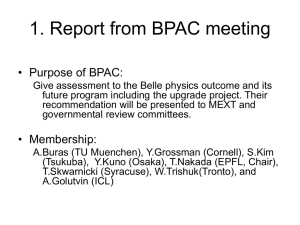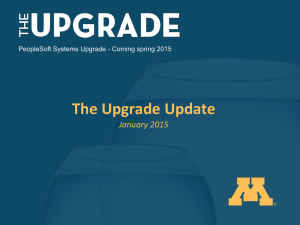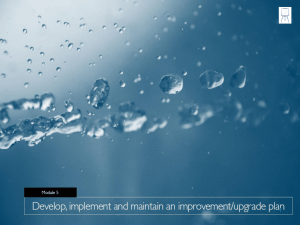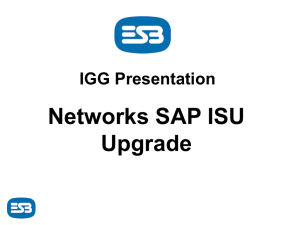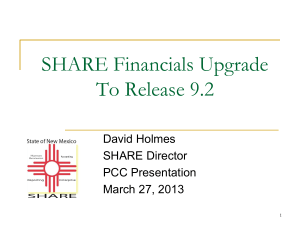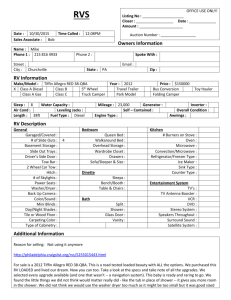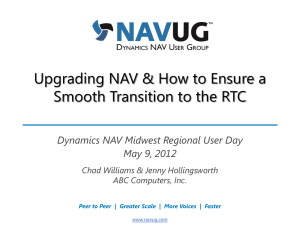nemsgfs_future_jd
advertisement
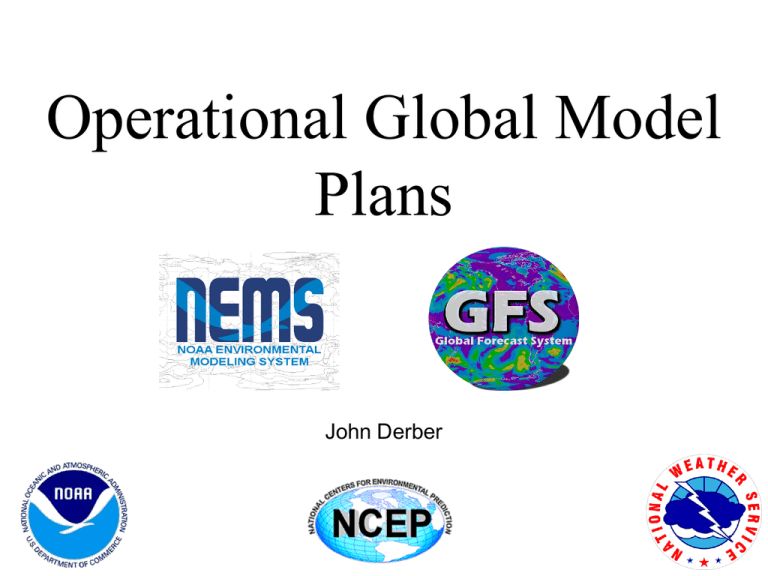
Operational Global Model Plans John Derber Timeline • July 25, 2013: Completion of phase 1 WCOSS transition • August 20, 2013: GDAS/GFS model/analysis upgrade #1 • April 2014: GDAS/GFS model/analysis upgrade #2 • Jan - June 2015: phase 2 WCOSS transition • Dec. 2015: GDAS/GFS/GEFS model/analysis upgrade #3 • Beyond 2016 2 Global Upgrade #1 (Aug. 20, 2013) • Primarily observation usage upgrade – Include METOP-B, NPP-CrIS, MSG-3 in data assimilation system – Possibly include post processor changes 3 Global upgrade #2 (April 2014) Probable components • Model – T1534 Semi-Lagrangian (~13km globally) – Use of high resolution daily SST and sea ice analysis – Physics • • • • • • Cloud estimate modifications Radiation modifications High wind surface drag modification Convective gravity wave drag Dissipative heating Snow accumulation consistent between model and post-processor – Land Surface • Removal of soil moisture nudging to climatology • Modification of vegetation tables • 20 category high resolution vegetation and high resolution soil type • Spin up of land state 4 5 Global upgrade #2 (April 2014) Probable components • Analysis upgrades – GPSRO quality control enhancements + METOP-B GPSRO – Updates to radiance assimilation • • • • Assimilate SSM/IS UPP LAS (1-7,23-24) data for F-17,18 CRTM v2.1.3 Unified angle/airmass bias correction Adjustments to ob errors and channel usage – Satwind data • GOES – hourly data • EUMETSAT cloud top WV winds – EnKF modifications • T574 semi-Lagrangian ensembles • Ensemble hurricane relocation • Stochastic physics for analysis ensembles • Ensemble – Unification of analysis ensemble with GEFS ensemble – Ensemble resolution increase to T574L64 6 Global upgrade #3 (Dec. 2015) Potential components • Model – Higher vertical resolution (~128 levels) - higher model top – Higher horizontal resolution – Physics • • • • – – – – WAM physics for higher levels Upgraded radiation (incremental neural net) Enhanced convective parameterization (for higher resolution) Upgrades to gravity wave drag Coupled ocean/atmosphere/ice/land (also 1-d lake model) Upgraded land and ocean models Non-hydrostatic NEMS infrastructure 7 Global upgrade #3 (Dec. 2015) Potential components • Analysis upgrades – Cloudy radiances for microwave observations – Cloudy radiances for IR observations – Additional IASI, AIRS and CrIS channels (esp. moisture channels) – Improved use of surface land variables – Station by station conventional data QC and ob. errors – Bias correction for aircraft observations – 4d hybrid assimilation – Enhanced variational Quality Control – Inclusion of diabatic effects in initialization • Stochastic physics for ensembles 8 Related global system modifications • Air quality model and Whole Atmosphere Model (WAM) – Unified? – Lower horizontal resolution – WAM • 600km top • High atmosphere physics – Air Quality • Inclusion of aerosols and chemistry • Surface sources (daily estimate) • Volcano sources 9 Beyond 2016 • Model – Higher vertical and horizontal resolution – Improved physics – WAM and AQ applications – impact on deterministic run – Possible new dynamic core • Analysis – Better use of current data – Use of more data – Improved use of cloud impacted radiances • Collaboration with external groups to enhance global prediction system • All work constrained by available human and computational resources and product delivery requirements 10
